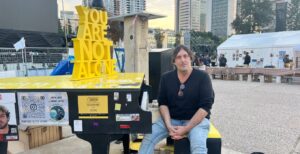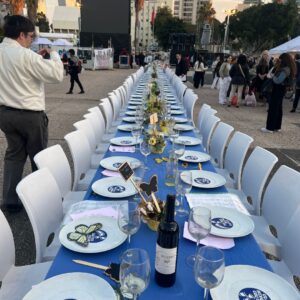Note: This is the sixth article of TC Jewfolk Editor Lonny Goldsmith’s trip to Israel with UpStart and iCenter’s “A Mifgash that Matters,” which is being put on in partnership with The Jewish Education Project and in collaboration with The Jewish Agency for Israel and made possible through support from the Jim Joseph Foundation. Read more: Part 1 | Part 2 | Part 3 | Part 4 | Part 5
Last week I was one of the thousands of people who make their way to Hostage Square in Tel Aviv daily. It was the last meaningful act of an incredibly meaningful week in Israel.
Hostage Square is the public plaza in front of the Tel Aviv Museum of Art, which has become home to several art installations, most notably the long, empty dinner table with spaces for each of those taken hostage by Hamas.
In the middle of the plaza, on a small riser is a yellow piano, dirtied and weathered by the elements. Sitting at it was St. Louis Park’s own Jeff Victor.
I’ve been told that running into random people that you’re somehow connected with while in Israel isn’t that surprising; after all I did run into the kids from the Michigan day school I graduated with last spring on the edge of Ramon Crater, and a member of trip I was on this time saw his son, a student on a gap-year program, in Moshav Netiv Ha’asara.
So random happens. And at a piano is not an unexpected place for Victor, a long-time musician, producer and composer. But in this place?
“I was here with my daughter about a week and a half ago, and I saw this piano sitting here,” said Victor. “I sat down and I said, ‘What the hell am I going to play?’ I sat down and played my own version of ‘Yerushalyim Shel Zahav,’ and people started gathering. People are coming up crying, leaving money on the piano like I’m Billy Joel’s ‘Piano Man.’
“I’m just looking around and getting this feeling like I have to play something meaningful to me and meaningful to other people. It was a real nice feeling of community. Emotions are high so I thought I needed to somehow play something that can be a backdrop to their emotions. And that’s what I did.”
Victor’s plans had changed. While in Israel for the past month, he was hoping to play music for IDF soldiers on army bases with his cousin, Minneapolis-native Peter Himmelman.
“Instead I was flipping burgers on the Golan, and I met with a family from Nir Oz who relocated,” he said. “It’s been a crazy three weeks. Every day is another mind-blowing experience. I could not have picked the better time to be for sure.”
Finding meaning in an emotional time
It’s a time of high emotions throughout Israel, and visiting for the week was no different. Throughout my week learning from people most affected by October 7, I came home with far too many takeaways to coherently put into writing. I’ve been trying all week and struggling to put it into words. Rabbi Lizzi Heydemann, the founding rabbi of Mishkan Chicago, gave her sermon on the experience last week, and it’s worth a listen.
Yes, I’ve written plenty about the week, and somehow it feels like I haven’t scratched the surface of the experience. We met an extraordinary cross-section of Israeli society. People whose friends were killed in truly horrific ways are now trying to keep their village together. The poet/peace activist who is helping soldiers and citizens write their own poetry to process their trauma.
We met Yarden Leal-Yablonka, the senior deputy director general of the Peres Center for Peace and Innovation, who said something that I think explains so much about life in Israel – regardless of Oct. 7: “To hold complexity and be empathetic is a muscle. If you don’t strengthen it, you can’t do it. The inability to see the whole story and hold that complexity, that muscle will serve them. If [people] only see one side, they are going be hit on the head all the time.”
The Israelis I learned from last week are holding so many things. Pain. Loss. Anger. Devastation. They are furious at a government that many feel has not supported them, and even threatened them, for speaking out. And they have hope.
“There’s a huge difference between reality and the fear and pain on the ground, and we have to bridge that divide.” Leal-Yablonka said. “We can’t copy/paste what we’ve been doing. We can’t build off pessimism.”
We also met the remarkable Bedouin cab driver Yussef Alziadna, a resident of Rahat who dropped clients off at the Nova Music Festival the night before only to get frantic texts at 6:30 a.m. on Oct. 7 that there was an attack.
Alziadna drove back into the chaos at Nova, dodging bullets and taking his life into his hands, to save people. He put 30 people into his 14-seat minibus, including Rom El-Hai, who told his story at Minnesota Hillel in December. Alziadna was hailed a hero by many but also started getting death threats from numbers with a 970 country code – Palestine.
He told us: “The people I saved, they’re Israeli citizens and so am I. Second of all, they’re human and so am I. Third of all, fuck off.”
He reported the calls to the police.
“People is all that we have,” he said. “We are all we have. Each other. We have to take care of each other.”






Lonny, so well done! Thank you for reporting heartfelt experiences to all of us!